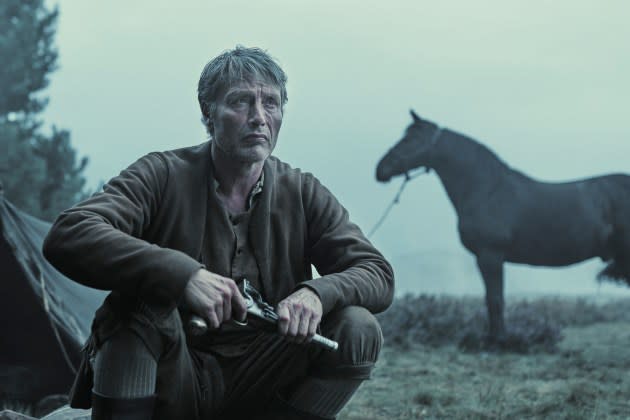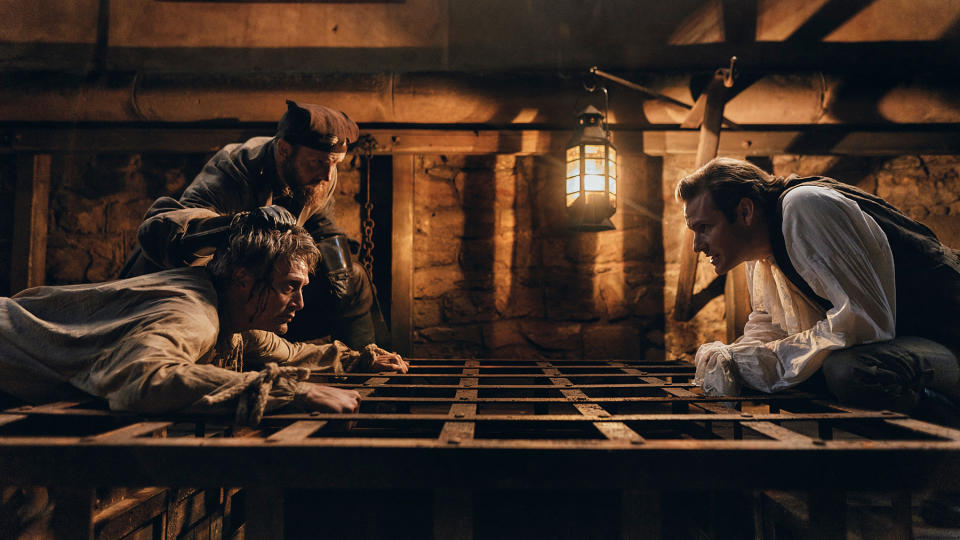‘The Promised Land’ Gives Mads Mikkelsen the Big, Bloody Epic He Deserves
- Oops!Something went wrong.Please try again later.
- Oops!Something went wrong.Please try again later.

You do not fuck with Mads Mikkelsen.
There are a number of takeaways to be had from The Promised Land, the excellent prestige drama-cum-bloody payback flick straight outta Denmark. The rich in 18th century Scandinavia were as entitled, immoral, and sociopathic as they are in 21st century everywhere. Just because you’ve fought for a country doesn’t mean it will give you a fair shake. Few things fill a big screen better than a grand, historical epic brimming with sweeping vistas, action-packed set pieces, and heroic men and women fighting for love, land, and a better tomorrow. Revenge is a dish best served cold, but tastes even better when accompanied by a side of potatoes.
More from Rolling Stone
But the main one is simply that, if you put the movie’s star up against just about anything — an uncaring aristocracy, an unyielding terrain, a sadist in a waistcoat, Mother Nature — you’d best bet on Mikkelsen. And god help you if you get on his bad side. The 58-year-old Danish actor has played cold-hearted billionaires and evil sorcerers, skinheads and Vikings, Nazis and serial-killing cannibals. His bad guy bona fides are impeccable. Yet the everyman he gives us in director Nikolaj Arcel’s tale of a stoic farmer trying to turn acres of stony ground into a homestead might be tougher than most of them. This is a person who seems unremarkable on the outside, just another hard laborer breaking his back in harsh conditions to make his fortune. In Mikkelsen’s calloused hands, however, he becomes a beacon of determination and righteousness. We’ve seen him turn dodgy, unethical characters into irresistible forces before. Here, he shows us what happens when you run straight into an immovable object with a chip on its shoulder. Resistance is futile.
“The heath cannot be tamed.” This is what an opening disclaimer informs us, setting the stage before we’ve even met the granite-faced gent who will prove it wrong. During the 1700s, the country’s royalty had been trying to attract settlers to a rural area plagued by barren soil, brutal weather, and bandits. None could hack it. A former army officer named Ludvig Kahlen (Mikkelsen) journeys to the king’s palace to stake a claim. He’s laughed at by the assembled magistrates: Why should they fund a down-and-out soldier’s folly? Kahlen declares that his meager pension is enough to get things going. He’s also convinced that he can succeed where hundreds have failed. All he asks is that he’s given a noble title once everything is occupant-friendly. They grant him a deed out of spite. Good luck, sucker.
Arriving at the heath and finding its reputation for inhospitality is well-earned, Kahlen nonetheless works the land. He has no money and virtually no prospects on the horizon. Still, this dogged amateur agrarian knows that if he can keep several bushels of the resilient non-native crop known as “potatoes” from succumbing to frost, he’s good to go. Thanks to a local priest (Gustav Lindh), he’s able to recruit two immigrants, Johannes (Morten Hee Andersen) and Ann Barbara (Raised by Wolves’ Amanda Collin). Both are former tenant farmers-turned-fugitives; Kahlen can at least offer them sanctuary if they help him. He also encounters a Tater girl named Anmai Mus (Melina Hagberg), who’s part of a gang of travelers and thieves. Soon, she and her fellow scallywags are enlisted in Kahlen’s cause as well. Seasonal setbacks, infertile land, a lack of reliable manpower and local prejudices — many refuse to work alongside the “dark-skinned” Anmai due to superstitious beliefs — are simply obstacles to be overcome by sheer willpower.
There is one issue, however, that Kahlen can’t simply work his way over, under and through. Frederik de Schinkel (Simon Bennebjerg) is the Lord of Hall Manor. He serves as the county’s judge and oversees numerous sharecroppers in and around his estate, including that couple on the lam now employed by Kahlen. This toxic prick of noble blood is also a rapist and a murderer. He’s long wanted to claim the heath as his own to consolidate his regional power, yet what’s this he hears? Some former army officer thinks he can just turn “the world’s asshole” into a settlement? Without involving him at all?! Schinkel initially tries a charm offensive, inviting Kahlen to dinner and attempting to disillusion him about his prospects: “Why castrate a wild beast that wants to be free?” When that doesn’t work, he tries extortion and mild intimidation. Kahlen won’t budge. Fine, thinks Schinkel. He’d prefer to do this the hard way anyway.

From here, The Promised Land turns into a battle that’s not just man vs. nature — it’s as much a survivalist thriller as it is a period piece — but a working-class hero vs. a one-percenter for which the cruelty is very much the point. Arcel has long done well by his star, having cast him in the lavish 2012 costume drama A Royal Affair and co-conceived Mikkelsen’s 2019 vengeance-is-mine thriller Riders of Justice (2020). Yet the role of Kahlen feels more like a gift to the actor, allowing him to play somebody that’s a cross between a throwback matinee idol, a father figure (after tragedy strikes Kahlen, Ann Barbara and Anmai Mus become the equivalent of a family unit), and a stone-faced killing machine. You see this weathered figure lighten up by small degrees, even if there’s not a glimpse of a smile until the halfway point. And you’re also reminded that he was a decorated military man who’s acquired a particular set of skills over a long career. You know, the kind that make him a nightmare for people like Schinkel and any mercenaries he might use to bully settlers….
It helps that Bennebjerg is one gleefully malicious villain as well, and that Mikkelsen gets not one but two romantic interests, courtesy of Collin and Kristine Kujath Thorp’s aristocratic ally. What really sells The Promised Land, though, is its scope. Arcel and his filmmaking team lean into the natural landscapes, both breathtaking and overwhelming, and their set-designed-to-excess estates of the rich and rancid; it’s the sort of once-upon-a-time epic that takes its cues from David Lean’s Sixties adventures and those big fence-swinging movie-movies of the Nineties like Braveheart. (Minus, er, the more problematic aspects of Mel Gibson’s Scottish history lesson.) It’s as much a showcase for a bygone sense of widescreen showmanship as it is for its star.
Yet this isn’t strictly a nostalgia trip for TCM viewers, either. Arcel and Mikkelsen have come up with the Danish equivalent of a roadshow extravaganza that feels rooted in its own country and culture, while tapping into a universal sense of large-canvas storytelling. The Promised Land is, if nothing else, a nod to both its nation’s and the movies’ past. The feudal warring over unclaimed Jutland territory may be strictly Danish, but the excitement, romance, and awe-inspiring visual spectacle of this melodrama is vintage Hollywood.
Best of Rolling Stone

